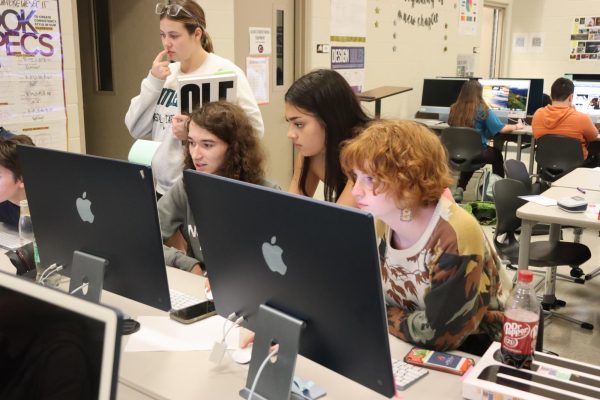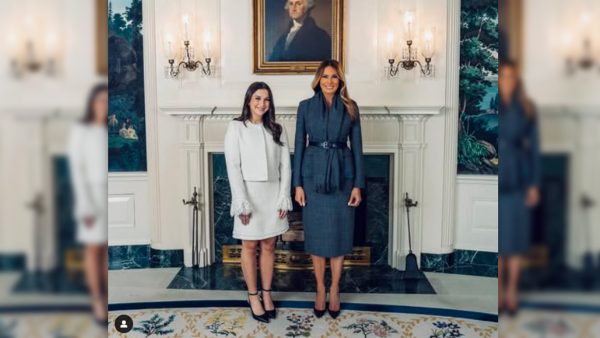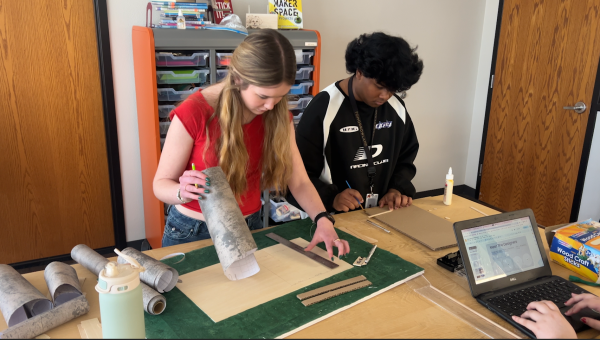Second Band Student Makes All-State Jazz Band
“Hey, Mr. Paul and Mr. Albin want you in the band hall.”
Pausing in his early morning practice in the chilly auditorium foyer, senior William Moeller walks down the silent theatre hall, trombone in hand, into the band hall to see Mr. Paul and Mr. Albin, huddled around a laptop talking quietly. He walks up to them, and after a second asks, “Am I in trouble?”
“No, we just wanted to tell you that you made All-State,” they both said. “Congratulations!”
Making the All-State Jazz Band is no small feat, only 20 students are selected through a process that begins with hundreds. Noah Roper made the All-State Jazz band in 2013-2014, but was the only person from Aledo, until this year. William has practiced since summer to audition this semester.
“I just practiced probably like an hour every day,” William said. “The summer was a little weird, especially with COVID, so I didn’t get to stick to that schedule. But when I came back to school, I just went to what I usually did. I usually get to school at like 6:30 in the morning and I go to the foyer and I just practice for maybe a couple, an hour or two, every day. And then I also have a private lesson teacher who’s able to help me, you know, understand. You know, I play for him and he’s like, hey, do this, do that.”
There are two bands students can audition for All-State, the Concert Band or Jazz Band. One of the main differences between the two is that students auditioning for the Jazz Band are allowed to mix and do things differently than what is written in the music.
“I mean [Jazz] originated in New Orleans from people just gathering on the street playing an instrument and having fun,” William said. “They just wanted to go play some music. ‘Get your sousa[phone], get your trombone, you know, let’s just mess around with it.’ So, improvisation is in the nature of jazz and you can just add whatever you want and you can add musicality to it, which normally gets you more points.”
Every year TMEA (Texas Music Educator Association) holds a convention in San Antonio where bands and choirs composed of Texas music students perform for music educators from around the state and country. In a normal year, students gather at different high schools and spend all day waiting for their turn to perform in front of judges. However, because of COVID-19, all the auditions this year were virtual.
“They have this software that they use, and I just recorded audio,” William said. “Just audio, not video. So, for All-Region, I just recorded my etudes and my improvisation and sent that to TMEA. They judged it, they put out the results, and then they said, “Hey you made Area.” So now I recorded, using the same software, audio and sent that in again to TMEA to be judged in the All-State process.”
William used MusicFirst to record his audition submissions. The etudes are instrument-specific songs used usually for some sort of technique and the improvisation is a solo Moeller had to come up with on his own. The software allows the musician to record as many times as they wish, but after each recording, they can either keep or pass the recording. If they choose to pass on the recording, the old one is deleted and they must record again.
“There’s only a small amount of kids so we were able to [record] everybody comfortably at the high school,” William said. “I definitely have to give Tayton Crustsinger a shout out for this one because he has an amazing recording microphone and stuff, and he was able to record me and he made me sound very amazing so he definitely helped me get through that All-State process.”
The virtual process allowed students to play their audition for band directors, friends or parents and get feedback before submitting them. It also allowed them to try multiple times to get the best recording possible, whereas in-person auditions give each auditionee only one chance.
“I recorded it and I was like, ah, I don’t think so,” William said. “I’m not, I’m not sure about this. And so, I showed it to my band directors, I just let them listen to it and they’re like, “Hey, now you can do better than that,” so then I went in and I recorded my improv again. And then it was better.”
The All-State bands perform at the convention in February, this year COVID-19 is forcing TMEA to change how things are done. Things are still uncertain, but as of now, the convention and performances will either be virtual or this summer.
“Now, with COVID, they’re trying their best to come up with a plan because it’s a really, really amazing experience getting to play with some of the best musicians across the state,” William said. “And Texas being one of the best music states it’s just an amazing ensemble in general. So they want to keep that experience.”








